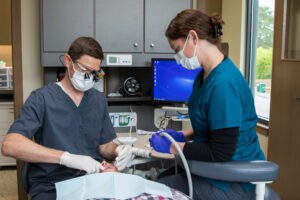
When our patients come in with toothaches, we’ll examine the area to see if a root canal may be the best treatment for you. Root Canals treatment will relieve pain and prevent a tooth infection’s spread.
Our priority is to keep your existing teeth healthy. Sometimes tooth infections require an extraction, but a root canal could help you avoid losing your tooth! Root canal therapy removes infection and pain, allowing you to save the tooth and continue with your daily routine.
What Is a Root Canal?
A root canal is typically a simple procedure and is used to treat infected or damaged teeth without having to extract them. Inside each tooth is the pulp, which runs down through the root and provides nutrients and nerves to the tooth. If the pulp becomes injured it will die, and without treatment, it will eventually become infected.
Deep cavities or cracked teeth are common causes of tooth infection. These types of problems allow bacteria into the pulp. The infection allows pus to build up at the root tip, forming an abscess that can cause damage to the bone around the teeth. If the infected pulp is not removed, it can cause intense tooth and jaw pain.
Your tooth can often still be saved rather than extracted by performing root canal treatment, which removes the infected pulp, immediately easing pain. A crown or filling is placed on the tooth after the procedure is complete, strengthening the tooth while helping you keep your great smile.
Endodontist
Endodontists are dental specialists who focus on the study and treatment of tooth pulp. In the United States, they are required to study an extra two to three years after graduating from dental school to earn their specialist certification. While a regular dentist can perform a root canal, endodontists are considered specialists in root canal treatments.
Common Questions About Root Canals
What You Can Expect From a Root Canal?
As stated above, root canal procedures are rather simple, and usually don’t take long to complete. Anesthesia is used to help you relax and numb your mouth during the treatment process.
Here are three things you can do before your treatment to ensure a smooth procedure:
- Take pre-treatment medication. If you are given medicine before the procedure, make sure you take it as instructed. Antibiotics can reduce inflammation, which in turn will allow for easier treatment and quicker recovery. Consult your dentist if you are unable to take prescribed medicines before your root canal procedure.
- Eat and drink before the procedure. While patients typically recover from root canals after just a few hours, some patients have to wait longer before they can eat or drink properly again. Unless advised otherwise by one of our dentists, we highly recommend having a full and healthy meal a few hours before your root canal procedure.
- Avoid Smoking. Tobacco and other substances that fill your mouth while smoking greatly reduce your oral recovery. We strongly advise against all forms of smoking several days before and after your appointment. Failure to do so can lead to greatly reduced treatment effectiveness and additional oral health problems.

Are Root Canals Painful? Do Root Canals Hurt?
Over the years, root canals have gained a reputation as painful procedures.
That is no longer true! Thanks to modern endodontic treatment procedures and new forms of anesthetics, a root canal should relieve your pain —not cause it. Ideally, a root canal is equivalent to getting a cavity filled. Many of our patients can eat, drink, and return to work a few hours after their root canal appointment.
If you do have concerns about the treatment, or have a prior history of heightened oral sensitivity, please consult our dental time ahead of your appointment.
How Much Is a Root Canal? How Much Does a Root Canal Cost?
Costs for root canals will vary with the level of treatment needed to repair your tooth, and may also depend on which tooth is being treated. Treatment costs will also vary depending on your dental service provider and insurance coverage. For a consultation and full breakdown of treatment costs, reach out to us at any time by contacting our dental team.
How Long Do Root Canals Take?
In general, a root canal appointment takes one to two hours, although treatments may take longer for difficult teeth, or for those with multiple roots. Most tooth infections only require one treatment, though some infections will require an additional visit.
We will do our best to give you an accurate estimate of how long the root canal treatment should take before your appointment. You can always contact us and change your appointment if you are concerned about your treatment fitting into your schedule.
Experiencing Symptoms of a Toothache or Tooth Infection?
The following symptoms are great indicators that you may require a root canal to treat your tooth infection:
- Swollen jaw
- Loose teeth
- Chipped teeth
- Swollen gums
- Tooth discoloration
- Pain when touching teeth
- Blood or pus leaking from teeth
- Tooth pain that doesn’t go away
- Extreme sensitivity to food, liquids, temperature, or pressure
Root canals are a very effective treatment option for infections that will reduce the need to take the tooth out altogether. With modern endodontic treatment options, you may be able to get your teeth treated and fully recover in just a few hours. With proper care, your root canal can last a lifetime, reducing pain and the need for possible extractions.
Don’t Delay | Call Us Today!
If you’re suffering from tooth pain, consult our team at Silverdale Dental Center today! We will help you determine if a root canal, or another treatment option, is the best solution for your personal dental needs.

